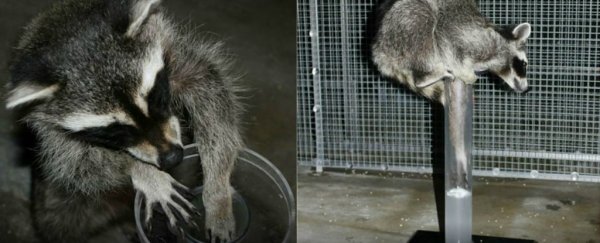Intelligence is a fickle thing. If you give a crow a puzzle, it could try to solve it. If you give a puzzle to a raccoon, a new study has found that it might just tip it over.
Many scientists have used a test paradigm in which the creature under investigation has to figure out how water displacement works in order to reach a treat. As it turns out, some raccoons just don't buy into the premise.
The paradigm of water displacement actually comes from an ancient Greek fable written by Aesop called "The Crow and The Pitcher", and it's been used to investigate whether birds and small children understand how cause and effect work.
The fable is about a thirsty crow that can't drink from a pitcher with a low water level. To raise the water level higher, the bird drops stones in the pitcher until the water level rises and it can drink. (This paradigm has actually been tested on New Caledonian crows with amazing results.)
Now, a group of researchers from the University of Wyoming and the USDA National Wildlife Research Center has found that raccoons have a different way of being innovative when it comes to getting their sweet prize.
In this new study, the researchers set up a cylinder with a floating marshmallow too low for the raccoons to grab. You can see this in action in the picture below:
 Lauren Stanton
Lauren Stanton
For the training session, the team balanced some stones on the rim of the tube. When the raccoons knocked them in, it showed how dropping stones in the water would raise the height.
Once this had been done, the researchers set up the experiment again, this time with stones on the ground.
Two of the eight raccoons realised that if they pick up these stones, they can use them to bring up the height of the water and reach the delicious marshmallow.
But a third sneaky raccoon managed to create an entirely new method – tipping the entire, very heavy tube so the sugary snack would just come out with the water.
Birds certainly haven't done that before, as far as we know.
"We found raccoons to be innovative in many aspects of this task, and we observed diverse, investigative behaviours that are unique to raccoons," says one of the researchers, Lauren Stanton.
It's important to note here that in terms of scoring, the raccoons actually didn't do as well as the birds and children that have done this test before.
For example, when the researchers gave the raccoons different-sized stones, the animals didn't go for the biggest stone first, which would have had the biggest effect on the water displacement.
But the researchers are still optimistic about the learning abilities of the raccoons, noting that there are more factors at play here than just intelligence.
"We suggest that raccoon performance in this paradigm reflected differences in tangential factors, such as behaviour, morphology, and testing procedures, rather than cognitive deficiencies," the team wrote in their paper.
As Stanton explained to the BBC, the raccoons just used whatever they had on hand to make it work.
The team thinks that the raccoons might not be interested in the most logical option because they are happy to explore, like they would in the wild - or in your local suburban bin.
"Our study demonstrates that captive raccoons are able to learn to solve novel problems and that they approach classic tests of animal cognition in diverse and exciting ways," said another team member, Sarah Benson-Amram.
"We can't wait to see what they do next."
So what we've really learnt here is that raccoons are just as cunning in marshmallow experiments as they are in the wild. We're honestly not surprised.
The research has been published in Animal Cognition.
